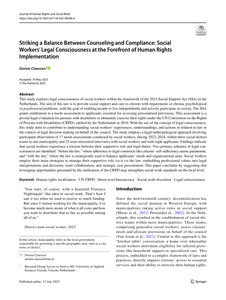The main hypothesis underlying this article is that although arbitrators are not formally part of national justice systems, they have dealt with questions of EU fundamental rights and the European rule of law standards for quite some time, at least formally since the landmark CJEU judgment in Eco Swiss in 1999. In fact, in all forms of arbitration, be it national or international, taking place in or across (Member) States daily and not necessarily concerning the application by arbitrators of EU law stricto sensu, arbitrators can be seen as guardians of many crucial procedural guarantees that increase parties’ access to justice and advance the European rule of law, or so we wish to argue. This article is an exploratory piece. That is, it combines the format of the state-of-the-art review with the format of conference proceedings through which we present the main activities of the DG Justice TRIIAL project concerning arbitration. Our main goal is three-fold: (1) to advance the discussion on the relationship between the European rule of law and arbitration, (2) to present the main findings stemming from research and training activities within the TRIIAL training workshops on arbitration, and (3) to formulate future research and practical questions on the topic at hand.
MULTIFILE

To facilitate energy transition, in several countries regulators have devised ‘regulatory sandboxes’ to create a participatory experimentation environment for exploring revision of energy law. These sandboxes allow for a two-way regulatory dialogue between an experimenter and an approachable regulator to innovate regulation and enable new socio-technical arrangements. However, these experiments do not take place in a vacuum but need to be formulated and implemented in a multi-actor, polycentric decision-making system through collaboration with the regulator but also energy sector incumbents such as the distribution system operator. We are, therefore, exploring new roles and power division changes in the energy sector as a result of such a regulatory sandbox. We research the Dutch Energy Experimentation Decree (EED) that invites homeowners’ associations and energy cooperatives to propose projects prohibited by extant regulation. In order to localize, democratize and decentralize energy provision, local experimenters can, for instance, organise peer-to-peer supply and determine their own tariffs for energy transport. Theoretically, we rely on Ostrom’s concept of polycentricity to study the dynamics between actors involved in and engaging with the participatory experiments. Empirically, we examine 4 approved EED experiments through interviews and document analysis. Our conclusions focus on the potential and limitations of bottom-up, participatory innovation in a polycentric system. The most important lessons are that a more holistic approach to experimentation, inter-actor alignment, providing more incentives, and expert and financial support would benefit bottom-up participatory innovation.
LINK
This study explores legal consciousness of social workers within the framework of the 2015 Social Support Act (SSA) in the Netherlands. The aim of this law is to provide social support and care to citizens with impairments or chronic psychological or psychosocial problems, with the goal of enabling people to live independently and actively participate in society. The SSA grants entitlement to a needs assessment to applicants, essential for accessing personalized provisions. This assessment is a pivotal legal evaluation for persons with disabilities to ultimately exercise their rights under the UN Convention on the Rights of Persons with Disabilities (CRPD), ratified by the Netherlands in 2016. With the use of the concept of legal consciousness, this study aims to contribute to understanding social workers’ experiences, understandings, and actions in relation to law in the context of legal decision-making on behalf of the council.
MULTIFILE
